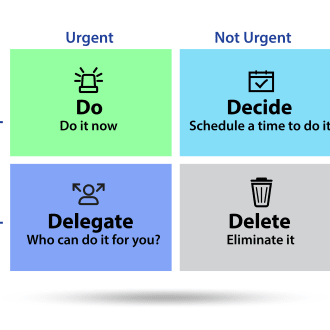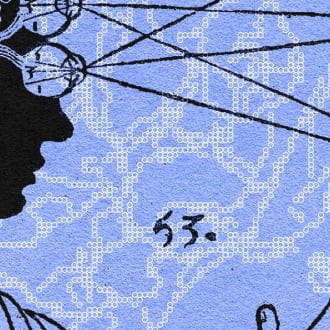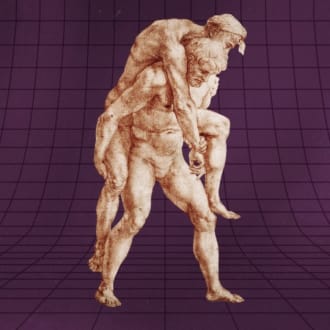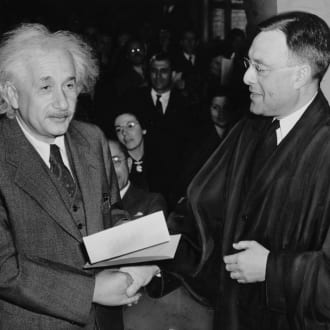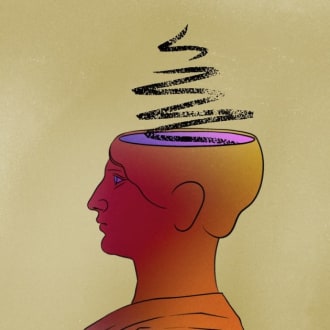The Best of Big Think
20+ most popular Big Think articles, as voted by our community.
New this Week
These are fresh off the press.
Does light itself truly have an infinite lifetime?
One of the most enduring ideas in all the Universe is that everything that exists now will someday see its existence come to an end. The stars, galaxies, and even the black holes that occupy the space…
3D-printed “metamaterial” is stronger than anything in nature
Using lasers and metal powder, Australian scientists have created a super strong, super lightweight new “metamaterial” — but they got the idea for this sci fi-sounding creation from plants.The…
Trending
These are currently making the rounds on Refind.
How fear of regret influences our decisions
One of the primary motivators of human behavior is avoiding regret. Before the legendary behavioral economists Daniel Kahneman and Amos Tversky formalized prospect theory and loss aversion, they…
How a second language can boost the brain
ven when you’re fluent in two languages, it can be a challenge to switch back and forth smoothly between them. It’s common to mangle a split verb in Spanish, use the wrong preposition in English, or…
Why the “Eisenhower matrix” is a fantastic productivity hack
Subscribe for counterintuitive, surprising, and impactful stories delivered to your inbox every Thursday Does this sound familiar? You have an important project due, but as soon as you log in for the…
«they’re just crowding out your desk space, your drive space, your head space and causing you to not be able to focus on what really matters.»
The new science of optimism and longevity
Being optimistic or pessimistic is not just a psychological trait or interesting topic of conversation; it’s biologically relevant. Indeed, there is mounting evidence that optimism may serve as a…
Stop saying that ChatGPT “hallucinates”
We are at the dawn of a new era. Over the past year or so, new versions of artificial intelligence have emerged, leading some to claim machine sentience is around the corner. This is either taken to…
Big Think on Aging
The most damaging exercise myth
It is widely believed that it is normal to become less physically active as you get older. But this is a pernicious myth about exercise.
Rules for sustaining peak performance as we grow older
Biotech will offer us longevity, and we can harness downstream "superpowers" to improve key skills and live much better as we age.
«I had to do what I was always telling other people to do if they wanted more flow in their lives: Get comfortable with being uncomfortable.»
Big Think on Consciousness
Brain experiment suggests that consciousness relies on quantum entanglement
New research indicates that consciousness may rely on quantum mechanics. Perhaps the brain does not operate in a "classical" way.
Neuroscience research triggers revision of a leading theory of consciousness
Data shows that unconsciously processed images are distributed to higher-order brain networks. A popular consciousness theory needs revision.
Big Think on Happiness
Why humans are surprisingly bad at being happy
Sometimes, it’s really hard to be happy. And there’s a reason for that: The human brain isn’t hard-wired for happiness. Why? Because happiness isn’t essential for survival. To make matters worse, our…
«Miswanting is the act of trying to go for certain things that we assume are gonna make us feel happy, but then they don't make us as happy as we think.»
Aging gratefully: Will you be happier in old age?
Why is grandma so relaxed? Is it coping skills? Cognitive decline? A new study asks whether old age brings increased happiness, and why.
«ge still report higher psychologic»
Big Think on Philosophy
To make great changes in your life, follow the philosophy of kaizen
When we set insurmountable and unrealistic goals, it's easy to get demoralized and just give up. Kaizen offers us another (better) way.
«There’s something wrong with each of us. Even if you tried to live a faultless, blameless, perfect life, there is always something left to criticize.»
The Swedish philosophy of lagom: how "just enough" is all you need
Just because a thing is good doesn't mean that you need more of it. "Lagom" teaches us to appreciate that "just enough" is all we need.
«A “fulfillment wheel” is a way to measure balance across different aspects of life. Lagom is to be well-rounded and to take pleasure in that»
Big Think on Physics
Einstein's 7 rules for a better life
When it comes to living your best life, Albert Einstein — notorious as the greatest physicist and genius of his time, and possibly of all-time — probably isn’t the first name you think of in terms of…
«Blind obedience to authority is the greatest enemy of the truth.” In the era of fake news, this lesson is more important to assimilate than ever»
The mathematically correct way to tie your shoes
One of the major milestones of our early childhoods comes when we learn, for the first time, how to successfully tie our own shoes. As most of us learned, there are three key steps to making that…
Big Think on Quantum Physics
The fundamental problem with gravity and quantum physics
We have two descriptions of the Universe that work perfectly well: general relativity and quantum physics. Too bad they don't work together.
Our language is inadequate to describe quantum reality
The quantum world defies our ability to describe it in words. Human experience does not prepare us for its weirdness and uncertainty.
Big Think on Science
How language and social status change the developing brain
Brain development is a highly complex process that is strongly influenced by the environment in which a child is raised, with the earliest years of life being especially important for the emergence of…
«From the evidence that is currently available, it is clear that talking to babies plays a substantial role in the development of language circuitry in their brains.»
Can you trust your memory? This neuroscientist isn’t so sure
Science is full of drama. One century we’re basing the treatment of ailments on the four humors, then over two thousand years later, we find out it’s actually microbes messing with our bodies. For Dr…
Big Think on Space
17 pictures that show how mind-bogglingly large the Universe is
The observable Universe is 92 billion light-years in diameter. These pictures put just how large that is in perspective.
Can science ever discover the absolute truth about reality?
Is science absolute? Its truths and discoveries guide us towards the nature of reality, but we must always remain open-minded to revisions.
Big Think on Success
The 5-hour rule: How to turn a wasted day into a successful one
From Benjamin Franklin to Elon Musk, the most successful people in the world share one thing: they allocate time in the day to learning.
«5-hour rule.” In short, this is the rule where we spend one hour a day learning, reflecting, and thinking. The rule dates to Benjamin Franklin»
5 ways to set yourself up for success
Any success formula must start with your values and life goals. Here are five ways to find those and set yourself up for success.
«Success isn’t a condition without failure; it’s the condition of overcoming failure and improving.»
Popular
These are some all-time favorites with Refind users.
An ancient technique can improve your attention span
Modern conditions have overwhelmed our brain's attention system, but research shows 12 minutes of mindfulness training a day can help.
«Similarly, a negative mood can signal that something is wrong. That unease can propel you to solve the problem and lift the emotional pall.»
3 rules to express your thoughts so that everyone will understand you
It can be challenging to express your thoughts clearly. Alan Alda recommends three rules of three for effective and empathic communication.
«Maybe this sounds familiar: You’re expressing a difficult idea, thought, or feeling, and at the moment, it seems to be going well. Your audience is nodding at the appropriate beats. Your cadence has an uncharacteristic flow and eloquence. You even snuck in the world profligate and are 90% sure you used it properly. (Well, 80% sure. Definitely going to look it up later.)»
This 715-song playlist is scientifically verified to give you the chills, thanks to "frisson"
Listening to some songs can cause a powerful physiological response known as "frisson." What is it, and why does it happen?
«While it is understood that appreciation of beauty is central to what makes us human, it is not clear to researchers what»
We all can reach a "flow state." Here's how.
Journalist Steven Kotler offers tips for how to reach a psychological flow state, granting peak mental performance.
«Curiosity can lead you to become passionate about something, which can in turn drive that thing to give you purpose. The activity itself becomes fulfilling. It is the means and the end.»
Theory of mind: What chess and drug dealers can teach you about manipulation
From grandmasters to drug dealers, people who make deft use of "theory of mind" can remain several steps ahead of their rivals.
«Every social interaction is a game of chess, trying to get inside someone’s head to navigate what they are thinking or what they will do.»
What is Refind?
Every day Refind picks the most relevant links from around the web for you. is one of more than 10k sources we monitor.
How does Refind curate?
It’s a mix of human and algorithmic curation, following a number of steps:
- We monitor 10k+ sources and 1k+ thought leaders on hundreds of topics—publications, blogs, news sites, newsletters, Substack, Medium, Twitter, etc.
- In addition, our users save links from around the web using our Save buttons and our extensions.
- Our algorithm processes 100k+ new links every day and uses external signals to find the most relevant ones, focusing on timeless pieces.
- Our community of active users gets the most relevant links every day, tailored to their interests. They provide feedback via implicit and explicit signals: open, read, listen, share, mark as read, read later, «More/less like this», etc.
- Our algorithm uses these internal signals to refine the selection.
- In addition, we have expert curators who manually curate niche topics.
The result: lists of the best and most useful articles on hundreds of topics.
How does Refind detect «timeless» pieces?
We focus on pieces with long shelf-lives—not news. We determine «timelessness» via a number of metrics, for example, the consumption pattern of links over time.
How many sources does Refind monitor?
We monitor 10k+ content sources on hundreds of topics—publications, blogs, news sites, newsletters, Substack, Medium, Twitter, etc.
Can I submit a link?
Indirectly, by using Refind and saving links from outside (e.g., via our extensions).
How can I report a problem?
When you’re logged-in, you can flag any link via the «More» (...) menu. You can also report problems via email to hello@refind.com
Who uses Refind?
450k+ smart people start their day with Refind. To learn something new. To get inspired. To move forward. Our apps have a 4.9/5 rating.
Is Refind free?
Yes, it’s free!
How can I sign up?
Head over to our homepage and sign up by email or with your Twitter or Google account.




